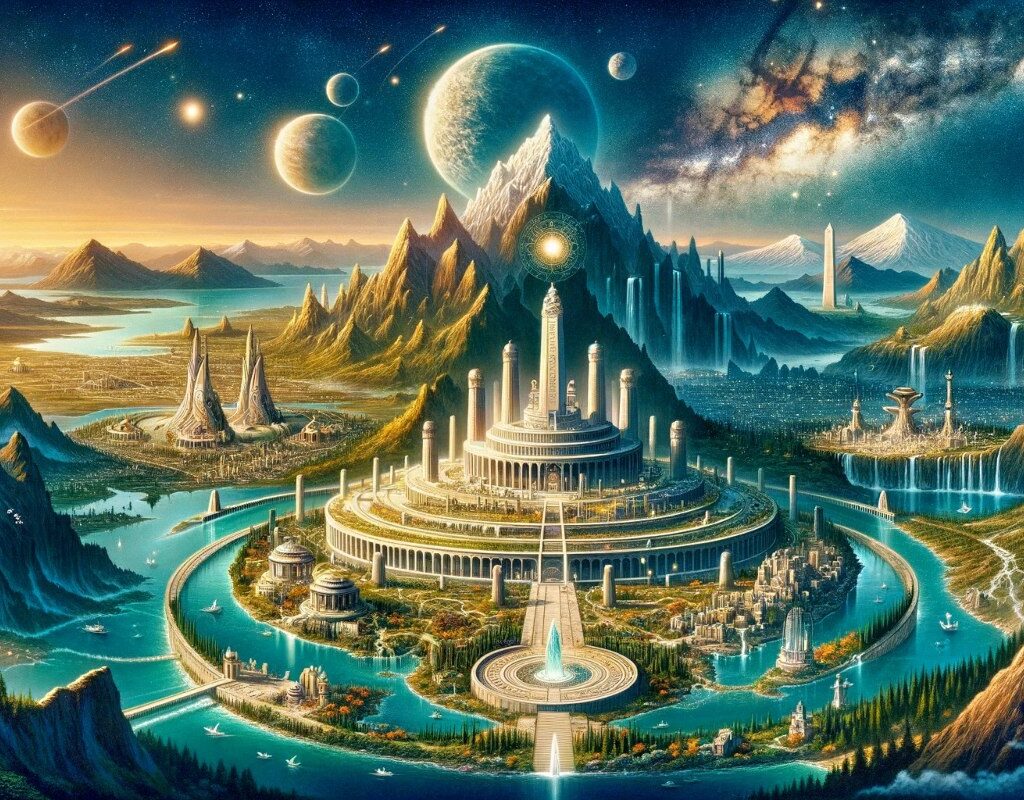In the vast expanses of the Atlantic Ocean, for 26,000 years, nine smaller islands surrounded a larger central one, the grand Atlantis. Eden, later renamed Poseidon, stood as the crown jewel of this empire, located on the southern coast of the main island.
The Majestic Rise and Tragic Fall of the Atlantis Empire
From the heart of Eden, spiritual leaders maintained a direct channel to the “High Divine Hierarchy of Melchizedek.” It’s believed these supreme beings resided in a stellar triptych at the center of our galaxy.
Atlantis epitomized a civilization at its zenith, boasting cultural and technological advancements that would astonish us today.
Harmony and brotherhood were cornerstones of their society. The concept of private ownership was alien to them; everyone shared the fruits of their labor equitably and each inhabitant lived in communion with their divine essence.
The 26,000-Year Atlantean Cycle
This empire lasted as long as our solar system takes to complete an orbit—a cycle of 26,000 years. During this time, Atlantis experienced two distinct epochs, each lasting 13,000 years.
In one, the Central Sun of the Galaxy illuminated their days, heralding an era of prosperity and bloom. In the other, darkness loomed, plunging Atlantis into what’s known as the galactic night. It was during this “night” that the fate of Atlantis shifted forever, between 10,500 and 11,500 BC.
The Sunset of Atlantis and the Dawn of New Times
The emergence of new civilizations, such as Egyptian, Mayan, Incan and Persian, set their calendars from this pivotal moment, marking it as the start of a “New Era.”
The catastrophe that consumed Atlantis wasn’t an isolated event. Earthquakes, tsunamis and other natural disasters rocked the world. Some theories suggest that this series of calamities stemmed from accumulated negative energies, the result of corruption and decay that plagued Earth in its darker period.
Regrettably, during these gloomy times, the Atlantean capital fell victim to malevolent forces that shattered its culture, temples and values. An era of decay took root, where debauchery and decadence reigned.
Thus, amid highs and lows, Atlantis, in all its glory and challenges, carved an everlasting niche in history and collective imagination.
The Deluge and Atlantis’s Downfall
At the heart of Atlantis, dark rituals became routine. This descent into gloom culminated in the monumental catastrophe known as the Great Flood. With the final melting of the Ice Age, Earth was submerged and Atlantis’s grandeur sank into the ocean’s depths.
Following this cataclysm, the planet split into two major continental masses: the Americas and the combined Euro-African land, burying the great Atlantean civilization beneath the ocean’s abyss.
Accounts of this cataclysm aren’t exclusive to one culture. Various sacred texts worldwide recount this devastating event, with many cultures asserting their descent from Atlantis.
Wise men and philosophers, from Plato to seers like Edgar Cayce and Helena Blavatsky, have spoken of the golden empire of Atlantis. Legend has it that its resting heart lies atop the Atlantis fracture in the Atlantic Ridge…

